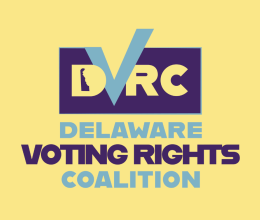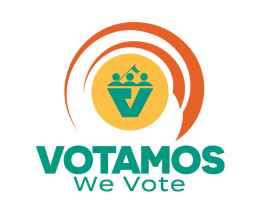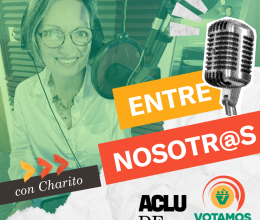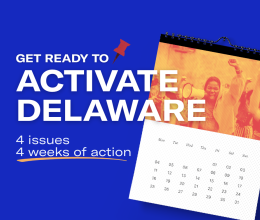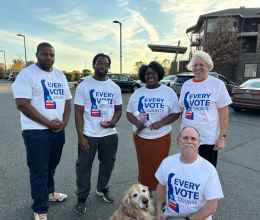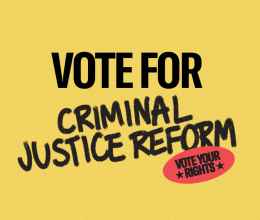“As a first generation Mexican-American, the inequity my family experiences became clear to me at a young age,” says Karelin Torres, recent University of Delaware graduate. “I have always felt a deep commitment to help Delaware’s Latinx community prosper. A large part of helping individuals successfully integrate into the larger community is giving them channels to have their voices heard. For example—voting.”
This sentiment motivated Karelin to get involved, encouraging Delaware’s Latinx communities to cast their ballots during the 2022 election season. The 2020 U.S. census revealed that 1 in 10 Delawareans identify themselves as Hispanic/Latino—a 10.5% increase from 2010. As the population continues to grow amidst increasing political attacks on immigrants, activists like Karelin have pointed out the need for increased state resources for Spanish-speaking individuals. During the past election cycle Karelin recruited bilingual poll workers from all over the state, working with ACLU-DE, the Delaware Department of Elections, and community organizations and advocates to ensure that bilingual poll workers were trained and placed at polling locations where they could best assist Spanish-speaking voters.
“It’s time to mobilize our friends and families to vote for the future of our communities and for those in our community who can’t vote,” she stated.
In addition to receiving her degree in Cultural and Applied Anthropology and Latin American Studies, Karelin was selected as the 2022 recipient of the prestigious John Lewis Youth Leadership Award. This award is given by the Secretary of State to an individual who has demonstrated exemplary leadership, a passion for social justice, and dedication to improving the quality of life for their community. She was presented the award at a ceremony held earlier this week.
We sat down with Karelin for the following interview to get more insight into her work and commitment to increasing Latinx political power.
ACLU-DE: What drew you to work with the ACLU of Delaware? What aspects of our work interest you most?
KT: My mentors, Charito Calvachi-Mateyko and Carla Guerrón-Montero—two inspirational women who gave me the opportunity to collaborate with the Entre Nosotr@s Radio in early 2021. This project is a collaboration between Latinx community members and the ACLU of Delaware, and is a prime example of why I love working with the organization. The ACLU of Delaware has so many ties to the local community and does a wonderful job of outreach to ensure communities stay informed.
ACLU-DE: What does the growing Latinx population mean for changes in Latinx political power? What does growing political power mean for the issues that are most important to the Latinx community in Delaware?
KT: I am hopeful that the growing Latinx population means that we will continue to assert ourselves in roles of power. Everyone can impact political power—activists, teachers, social workers—people on the ground have the ability to make change. It is vital that Latinx youth see people who look like them and have similar experiences as them making decisions for our communities. As more Latinx individuals enter the world of politics, I anticipate an emphasis on education reform and immigrants’ rights policies. Latinx children deserve equitable educational resources and environments. We deserve to provide for our families and contribute to our larger community without fear that one day our loved ones will be deported.
ACLU-DE: Can you elaborate on some of the barriers that the Latinx community continues to face, and what steps the state of Delaware, voting rights advocates, and elected officials should take to ensure Latinx voters are able to cast their ballots?
KT: From my own experience, one of the greatest challenges is not knowing what is happening in the larger community. Our community members are unaware of election dates and deadlines and channels to get involved during election season. Candidates forget about us, and the state doesn’t always prioritize education that addresses our specific needs. Within our community, there seems to be a disconnect between what we consider “political.” If you cannot afford a meal for your family, that is political. Not having access to health services, that is political. People in your community not having the right to vote yet remaining disproportionately impacted by the decisions made by elected officials, that is political. Our elected officials and state agencies must acknowledge and remedy the lack of civic education our community faces, and most importantly, listen to us when we are speaking from our experiences.
ACLU-DE: How can Latinx youth, both eligible and non-eligible voters, impact the election process and mobilize their communities?
KT: Many young Latinx community members have experienced the anxiety, stress and fear that comes with worrying about if your basic needs will be met or if your family will be torn apart or ostracized. I invite all my fellow Latinos to do your research. Find out who your elected officials are and where they stand on the issues that impact our communities most. Connect with programs and organizations that empower us, volunteer your time to educate our community about available resources, take the leap. It is a bit cliché, but we are responsible for advocating for our community, especially those who cannot participate in the democratic process.
ACLU-DE: What's the most important thing you learned in your advocacy/community work?
KT: One of the most important things I have learned through my work is the importance of utilizing and mobilizing your connections. We are all interconnected and many of us have similar goals. It makes advocacy a lot more fun and engaging when your community is fighting with you.
To learn more about our voter engagement work in Spanish-speaking communities, visit VotamosDE.org.

